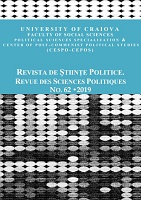Diplomacy and Motivation in the Political Discourse
Diplomacy and Motivation in the Political Discourse
Author(s): Anca Paunescu, Ileana Mihaela ChiriţescuSubject(s): Communication studies, Politics and communication, Theory of Communication
Published by: Editura Universitaria Craiova
Keywords: Elements of political discourse; expressiveness; strategies; theatricality of argumentation; adaptation; to interlocutor; intertextual intensity;
Summary/Abstract: Communication and politics are consubstantial. Communication relationships are inseparable from power relations, which, by their form and content, depend on the material or symbolic power accumulated by political institutions and agencies engaged in these relations. Political communication has as a specific the manifestation of a tension between cooperation and conflict. Political discourse allows for agreement, but the same kind of speech promotes conflict and domination. Whether persuasion or conviction, negotiation or intimidation is desired, recourse to political language is an alternative to physical violence. Public space has a conflicting character, but compromise is negotiated within its perimeter. Differences are balanced, the representation of those who are not in power becomes more lenient, those in power regulate their discourse. What is dominant in political communication is the word, written or spoken. In society, any problem can become politics. Politics evolves into the dynamics of economic, social, cultural, religious, ethnic, linguistic stakes. Political activity is focused on the emergence of collective issues, the formulation of questions addressed to public authorities, the development of solutions, the conflict between these projects and their regulation. In each of these processes communication is involved and its contribution to political activity is omnipresent, whether it is socialization and participation, agenda development, mobilization or negotiation. Communication impregnates all political activity to the extent that almost all such behaviors involve the recourse to some form of communication. The specificity of contemporary political relations and activities is the political belief crisis, which forces political people, as Gabriel Thoveron said, to invest more and more in the communication: ˮas soon as there is any difficulty between them and those who mandate them, it is considered to be a communication problem, to convince citizens of the basis of their acts or decisions.ˮ
Journal: Revista de Științe Politice. Revue des Sciences Politiques
- Issue Year: 2019
- Issue No: 62
- Page Range: 12-21
- Page Count: 10
- Language: English

